- Home
- Alex Archer
Seeker’s Curse Page 7
Seeker’s Curse Read online
Page 7
None of that was what Agrabat wanted to hear. “You lie!” he barked.
His men were getting tense, although neither the bear with the shotgun nor the nervous kid with the M-16 was pointing his gun at anyone yet. Annja sensed it was a matter of time. And not much time.
“Wait,” she said, holding up a hand and making a sort of smoothing-down gesture. Even with Lal and his old Enfield as an ace in the hole they were outnumbered and outgunned. And that was only if Lal hadn’t prudently just kept scampering up the hill and off across the landscape, leaving his mother’s brother, his cousin and their outland employer to whatever the wheel of fortune had in store for them.
“We have little of value,” she said. “We’ve found no treasure. We’re not looking for any. We’re merely looking for artifacts.”
The last sentence was barely out of her mouth before she realized her mistake. Nor was there any calling it back. With his excellent command of English Prasad translated her words almost as quickly as she said them.
It was as if a shift in the light struck a glitter from Agrabat’s obsidian eyes. His beard rounded in a smile around his gap-toothed mouth.
“So,” he said. “You find artifacts, then.” Clearly he knew about the relics trade, where even a piece of outright junk, a broken tool or pottery shard, could command big money in the international market if it was old enough.
Annja shook her head. “Nothing valuable yet. I told you, we’re not collectors—”
Agrabat barked something to his men. “Get ready,” Prasad murmured unnecessarily.
Agrabat’s expression softened. “You lie,” he said again. This time he said it calmly, almost conversationally. That was a bad sign. It meant he had settled upon a course of action. And was utterly confident the outcome would go as he anticipated.
“We will see,” he said. “We will take what we want in the name of the people. And maybe—”
His smile widened and his eyes ran down Annja’s body like clammy hands. “Maybe we shall enjoy ourselves some, too.”
He unsnapped his holster flap. To left and right his gunmen raised their weapons. His other men drew their knives with chilling deliberation.
10
The blast of a rifle fired from close by struck the back of Annja’s head, almost deafening her, stirred her hair like rough fingers and slapped the back of her shirt like a glad-handing drunk.
A small round hole, blue-tinged, appeared in the center of the M-16 kid’s forehead. The young man toppled straight backward as the gunshot echoed down the valley. The long black rifle fell from his hand.
At the same moment Bahadur’s arm whipped up from his side. A chunk of rock bigger than his fist flew up to smack the shotgunner between his eyes. The burly shotgunner dropped his weapon and went to his knees, bawling like a branded calf and clutching his face. Blood squeezed out between the knuckles of his grimy hands.
Annja was already moving. Prasad had already sprung upon Agrabat and wrestled him for control of the still holstered Webley. Bahadur whipped out his big ungainly utility knife, shouted and lunged to engage the man on the right in blade-to-blade battle.
That left Annja facing two bandits. Though she was a head taller than either, their eyes gleamed at the prospect of coming to grips with her. She knew well not to underestimate the strength of these men, the way they’d underestimated her.
She only hoped her allies were too engrossed in defending themselves to watch her too closely.
The nearer goon, to Annja’s right, didn’t even draw his blade. He just grinned with jumbled brown teeth and reached for her. She threw a shin kick up at the fork of his baggy trousers that lifted him onto his toes. He squealed in pain.
For a moment she thought she’d get away with not invoking her sword and all the potentially unanswerable questions it raised. But her opponent made another grab for her. He was wide open when she flattened his nose into his face with a forward right elbow smash that knocked him clean off his feet.
His pal came lunging from the left with his knife cocked back over his shoulder and a mad look in his eyes.
But Annja knew combat body mechanics on the reflex level. No matter how fast he was, the power shot he was readying took time to deliver. She didn’t give him that time. Instead she half turned away, raising her left knee, then pistoned her heel out in a side kick. She heard ribs crack with a sound like snapping kindling as her kick flung the knife man backward down the slope.
Strong arms enfolded her from behind in a bear hug. She felt hot breath down her neck as a powerful stink of accumulated filth enveloped her in an almost visible cloud. She had committed a cardinal sin of combat—forgotten a potential foe.
It had to be the shotgunner. Bahadur’s rock to the face had tripped his switches momentarily with the twin shocks of surprise and serious pain. Now he was back in the fight.
Annja’s legs flailed as he lifted her feet off the ground. Accidentally or by evil intent he swung her around to face the man whose nose she had smashed with her elbow. He was grinning through a half mask of his own blood, a kukri glittering in his hand. He drew his arm back to plunge the huge blade into her stomach. The forward-curved knives weren’t really optimized for stabbing. But it would make an awful mess of her.
She whipped her head back. The back of her skull slammed into the already injured face of the big bandit behind her. He grunted. His grip relaxed.
Annja whipped up both her arms. That broke the hug. She wheeled sharply right, cupping her left hand over her right fist to add extra force to a horizontal elbow smash into the side of her opponent’s head. He fell away from her.
But the knife-man was lunging for her. From the corner of her eye she saw a third bandit, the one whose ribs she cracked, was also on his feet and headed her way, knife in hand and eyes filled with rage.
She formed her right hand into a half fist and reached with her will.
Instantly the reassuring heft and solidity of her sword’s hilt filled her palm. Even as he raised his hand to strike, the charging knife man’s eyes flew wide at the lightning apparition of the blade in Annja’s hand. She slashed him downward across the chest. Blood spurted as he dropped to his knees, then pitched on his face.
She spun toward the bandit with the broken nose, intent on paying her back for his pain. Before she could counter his clumsy swing a shot cracked like thunder from the rocks above. Dust flew from the bandit’s chest. He grunted and collapsed as if his bones had dissolved inside him.
Annja turned to her right. As she did she saw Agrabat falling backward with blood streaming from his head and skinny Prasad, no longer bespectacled, following through the death stroke he had dealt his opponent.
Looming behind him, a kukri held blade down by two grubby, bloodstained hands, was the bearish man who had originally wielded the shotgun, his face a bloody mask of rage and diabolical triumphant glee.
He was too far for Annja to reach. As Prasad sensed the danger and began to turn, too late, Annja’s eye lit on the wired-together shotgun lying unfired ten feet from her.
Making the sword disappear, she swooped on the gun. Without time for finesse or care she stuck it out in front of her held in her right hand like a giant unwieldy pistol. The bandit was barely a dozen feet away. Annja knew in that distance the shot column from the long barrel would only expand slightly beyond the size of the bore, just under three-quarters of an inch. But she had to aim high along the long barrel to be sure of missing her guide.
Wincing in anticipation of pain and the weapon’s possible explosion in her face, Annja fired. The weapon roared, kicking itself free of her grip, nearly spraining her wrist and gashing her trigger finger with the trigger guard. Blood and cloth unraveled from the bandit’s left forearm.
He bellowed and staggered back a step. He still kept a grip on the hilt of his knife.
But he’d moved enough that Lal could shoot without endangering his uncle. The bandit spun with the third gunshot and went down.
Annja was swi
nging her stinging right hand in the air and wishing she’d used her left. Prasad looked up the slope and waved to his nephew. Then he turned to his employer.
“Are you injured, Annja Creed?”
“My hand’s felt better. With luck it isn’t broken.”
He bent down and picked up his glasses from where they had fallen. Miraculously they remained intact. He put them on his nose and blinked through the round lenses at her.
“You are bleeding,” he said.
“Not as bad as Bahadur.” She pointed past Prasad with her chin to where his cousin squatted on the ground beside the body of his foe, who lay facedown and unmoving. Bahadur’s face was pinched and sallow. He clutched his left arm. The sleeve from biceps down was red and dripping.
“Help get him fixed up. I’ll see if I can handle this myself,” she said. She had long since learned to be pretty adept with her left hand.
She dared hope—faintly—none of her companions had seen the Sword for the furious action. Their own death-battles had occupied Prasad and Bahadur. Annja knew how that tended to wind the vision down to a narrow tunnel focused on the foe. But Lal had been sniping, perched up ahead with a godlike view of the whole action, probably from seventy-five feet or less away. What had he seen?
After checking to make sure that all the downed men were going to stay that way, Prasad knelt beside Bahadur. Annja found a large rock near her backpack and sat down. She was shaking as she dug in a side pocket for her first-aid kit. She felt chilled, knew she was probably pale. Her fingers trembled and her joints felt like overboiled pasta.
And none of it was from fear. Nor revulsion. And least of all from remorse. But rather from the aftereffects of the massive adrenaline dump invoked by fighting for her life, inevitable and unavoidable as hitting the floor after rolling out of bed.
Lal came down the slope. He held his stubby little Enfield at midpoint balance. He had evidently hung out up in his hideout perch to make sure the bandits hadn’t had any pals following behind. He spared no more than a glance to the fallen men. He had seen his uncle make sure of them. That was enough for him.
The young guide was giving Annja a curious eye. Her lips compressed. Her mind started sorting through the possible rationalizations knowing they could only sound as unconvincing to this intelligent young man as they sounded to her.
As rapidly and efficiently as a seasoned cook chopping vegetables, Prasad was slicing untainted parts of Bahadur’s clothing into strips.
“So those are real kukris,” she called to him. “I thought they were just utility knives.”
“Just utility knives?” He laughed as he wound a makeshift bandage over a hastily folded compress. Annja hadn’t gotten a close look at Bahadur’s wound, nor was she eager to, but she was pretty sure his opponent had gotten a lick in on him that had laid the arm open to the bone.
“It is all things, Annja Creed. It does whatever we call upon it to do. When we wish to chop firewood, it is an ax. If we must drive nails, it is hammer. When we fight, it is the finest weapon in the world.”
She smiled and nodded, brushing away a wisp of hair that had strayed from the tight ponytail she normally wore in the field.
“You seem to be reacting well,” Lal said. His head was tilted to the right and he had a strange appraising light to his eyes. “You handled yourself very well.”
“For a tourist, you mean? I’ve had to learn to take care of myself since I was a kid. And I got lucky,” she said.
She didn’t want to insult the intelligence of these men—they had, after all, put their lives on the line for her against terrible odds, never suspecting she might be capable of taking a useful hand in the fight, far less a decisive one. But a little of the self-effacing act couldn’t hurt. She still hoped to defuse those questions she saw sparking behind Lal’s eyes.
And she knew she had been lucky, even though it didn’t feel like it as she bandaged her torn finger. As one of her countless martial-arts instructors had told her, “When two tigers fight, one dies, and the other is wounded.” So far Annja had been lucky enough never to take a truly incapacitating injury. She knew that couldn’t last forever.
“You fought well, too,” she said, trying to nudge the conversation away from her. “Are all Nepali guides so handy in a fight?”
Lal shrugged. “When they are Gurkha.”
She looked at him sharply. “You?”
“I served with the Indian army and the Royal Singapore Police,” he said. “My uncle fought with the British in Belize and the Falklands.”
“I thought you were Magar,” she said.
“We are,” Prasad said. “Gurkha come from many Nepali peoples.”
“My cousin did not serve abroad.” Lal—not so young as he looked, apparently—went on. “But he, like my uncle and me, fought with the army against the Communists.” His voice took on an unaccustomed edge.
His expression turned troubled. “I watched the fight for a clear target,” he told her. Her heart sank. Here it comes. “Something strange happened. I thought—”
Straightening, Prasad said something to the younger man. His voice snapped with a tone Annja had not heard the slight, self-effacing man use before. Prasad had never raised his voice.
Lal muttered something in return. He sounded defensive to Annja, but she didn’t really know the inflections of their language.
Lal turned to her, pressed palms together and bowed. It seemed to be in nature of a salute—unusual, as it was normally used as an all-purpose hello or goodbye.
“You fought as well as anyone I have seen, Ms. Creed,” Lal said. “I salute you.”
“Thanks,” she said. She’d always reckoned that was the best way to react to a compliment. Plus it could be a conversation-killer. And she really wanted this one dead.
A flying subject change never hurt. “What about those men?” she asked, waving at the bodies. Apparently all six were dead, which comforted her. She had a prickly certainty in her belly that if any had been merely wounded her companions would have finished them off without compunction. That would put her in a place, legally and ethically, she didn’t really want to go.
“What do we do about the bodies?” she asked.
Lal glanced at his uncle, who had helped Bahadur to his feet and got him to sit on a rock to gather strength. Annja felt momentary concern about circulation being cut off in his wounded arm by the tight wrappings Prasad had applied. Then again, it was a long walk to any kind of real medical assistance, and if Bahadur bled out on the way nothing else would matter much. Besides, it was clear the veteran Prasad had definitely done this before.
Prasad shrugged. “The ground here is hard,” he said, “so we should start digging before the sun gets much lower.”
He smiled. “Fortunately, there are plenty of loose rocks to help us cover them.”
After a quick check to make sure the hilt was clean she picked up a kukri that its former owner wasn’t going to be needing again. “These are shovels, too, I’m guessing?”
Prasad and his nephew exchanged surprised looks. “When they must be,” Prasad said. “But you—”
She smiled a taut little smile. “I’m an archaeologist, remember?” she said. “I know how to dig. And the daylight won’t last forever.”
11
A soft knocking at Annja’s door awoke her.
As was her habit she came fully awake. It was a trick she’d had to learn. By reflex she reached to her cell phone. Pressing a button at random lit its face to show her it was a little after two in the morning.
A lamp stood on the bedside table. She didn’t turn it on. Power service had been spotty since the troubles restarted. Anyway, turning on a light inside would alert whoever was in the hallway she was inside and awake.
Better a would-be evildoer think her either helpless or absent, rather than prepared to defend herself with ruthless ferocity. Cautiously she slipped bare legs out from under heavy blankets still smelling heavily of the original sheep, piled on her lumpy but c
ozy bed in the Baglung inn she had made her main base of operations.
Something slid beneath the door. Annja frowned. An envelope?
The sword appeared in her hand. The stitches a doctor in a Baglung clinic had sewn in her right forefinger and the bandages the nurse wound around it didn’t render the hand useless, as Annja feared they might, although her grip on the hilt was less positive than she liked. The savage kick of the 12-gauge monkey gun hadn’t broken anything, or even sprained her hand. It had bruised, twisted and torn it some. A random starlight gleam straying in through drawn shutters skittered reassuringly up her blade’s length as she crept noiselessly to the door.
Breathing shallowly through her mouth, Annja listened closely. Late night in Baglung was dead silent unless the wind blew—and it always did, chill and heartless from the mountains, booming at the windows, rattling the shutters, moaning like the damned beneath the eaves of the sharply pitched roofs. It was an eerie, soul-sucking sound. Her night visitor made no noises she could hear above the wind.
At last she slipped the chain as quietly as she could, turned the knob and peered out.
The hallway was dimly lit by what seemed like a five-watt bulb in a black iron sconce. It was enough light to show no one lurking there. Whoever had pushed the envelope under her door had slipped away as mysteriously. She let the sword go, back into the other where, farther than the end of the universe and never more than a thought away.
She ducked hurriedly back into the room, locked the door and reset the chain. Not that it would resist a stout kick or, if the door was cracked open, a good shoulder. But she knew from living in the thieves’ den that was New York that there was a certain benefit in culling the amateurs. It was like window screens and flies—if you didn’t take the trouble to screen out all but the wiliest, you got nothing done but swatting.
She turned on the table lamp.
She studied the mystery missive from several feet. It looked like a regular white envelope, the kind a hotel might leave in the drawer of the writing table along with some stationery for the convenience of its guests. This cobbled-together little inn offered no such amenities.

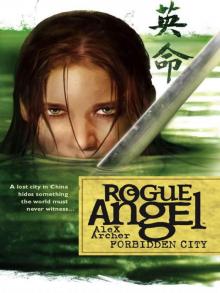 Rogue Angel: Forbidden City
Rogue Angel: Forbidden City The Spider Stone
The Spider Stone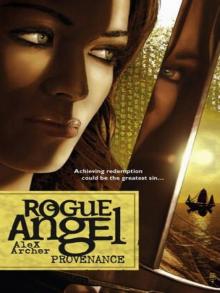 Provenance
Provenance Blood Cursed
Blood Cursed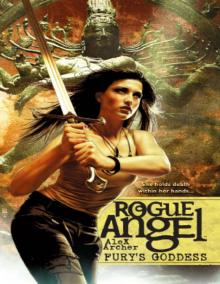 Fury's Goddess
Fury's Goddess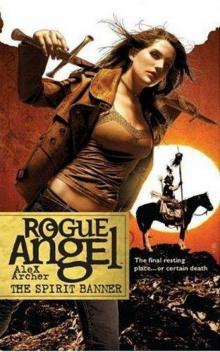 The Spirit Banner
The Spirit Banner Footprints
Footprints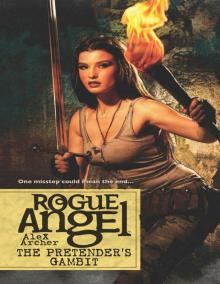 The Pretender's Gambit
The Pretender's Gambit Rogue Angel: The Lost Scrolls
Rogue Angel: The Lost Scrolls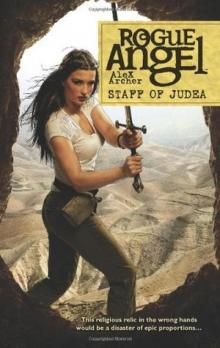 Staff of Judea
Staff of Judea Rogue Angel 55: Beneath Still Waters
Rogue Angel 55: Beneath Still Waters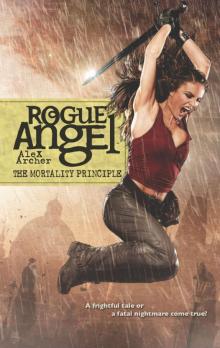 The Mortality Principle
The Mortality Principle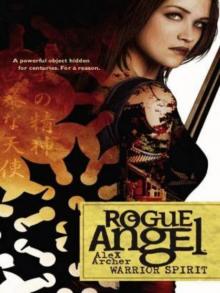 Warrior Spirit
Warrior Spirit Paradox
Paradox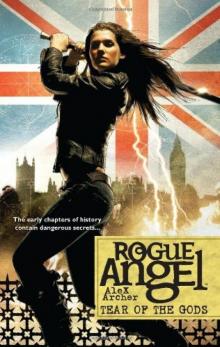 Tear of the Gods
Tear of the Gods Forbidden City
Forbidden City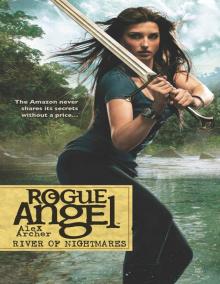 River of Nightmares (Rogue Angel)
River of Nightmares (Rogue Angel)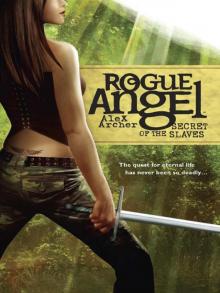 Rogue Angel: The Secret of the Slaves
Rogue Angel: The Secret of the Slaves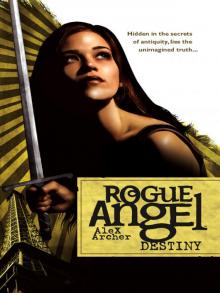 Destiny
Destiny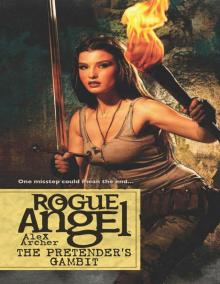 Rogue Angel 51: The Pretender's Gambit
Rogue Angel 51: The Pretender's Gambit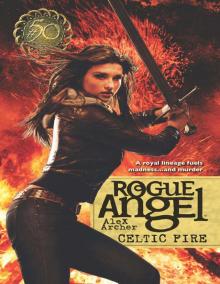 Celtic Fire
Celtic Fire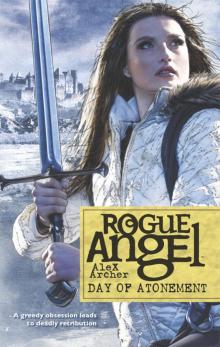 Rogue Angel 54: Day of Atonement
Rogue Angel 54: Day of Atonement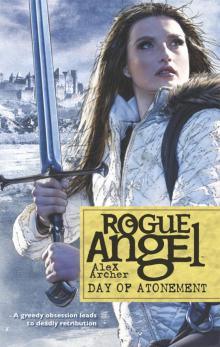 Day of Atonement
Day of Atonement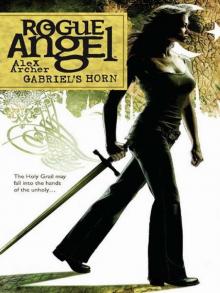 Rogue Angel: Gabriel's Horn
Rogue Angel: Gabriel's Horn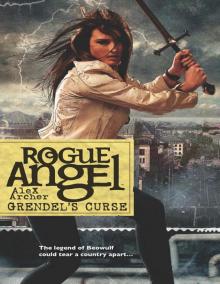 Grendel's Curse
Grendel's Curse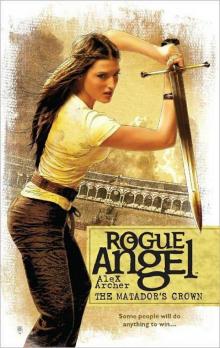 The Matador's Crown
The Matador's Crown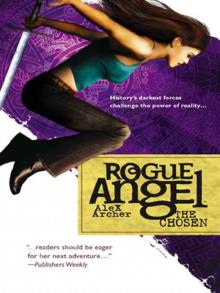 Rogue Angel: The Chosen
Rogue Angel: The Chosen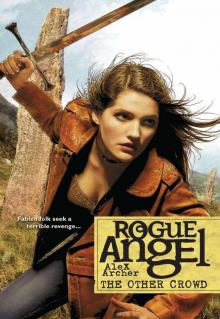 The Other Crowd
The Other Crowd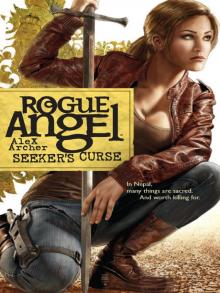 Seeker’s Curse
Seeker’s Curse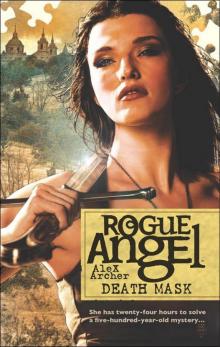 Rogue Angel 52: Death Mask
Rogue Angel 52: Death Mask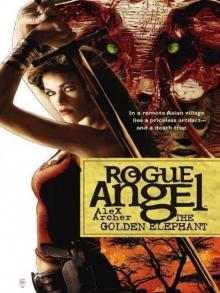 The Golden Elephant
The Golden Elephant Blood Cursed (Rogue Angel)
Blood Cursed (Rogue Angel)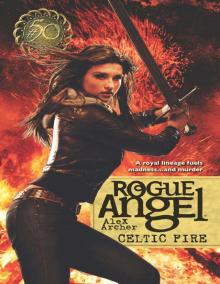 Celtic Fire (Rogue Angel)
Celtic Fire (Rogue Angel)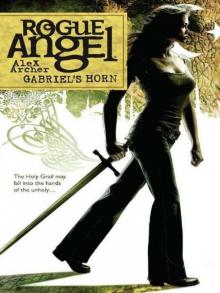 Gabriel's Horn
Gabriel's Horn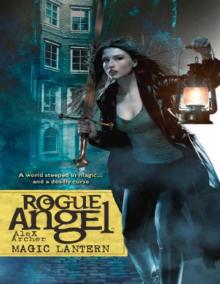 Magic Lantern (Rogue Angel)
Magic Lantern (Rogue Angel)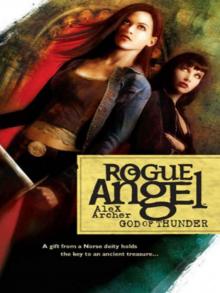 God of Thunder
God of Thunder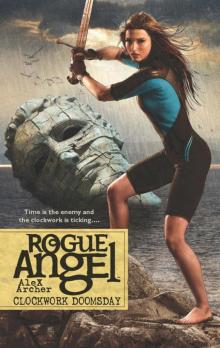 Clockwork Doomsday
Clockwork Doomsday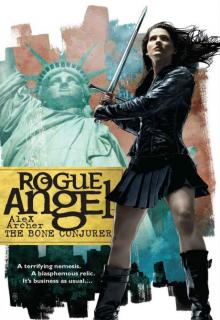 The Bone Conjurer
The Bone Conjurer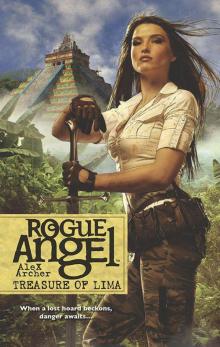 Treasure of Lima
Treasure of Lima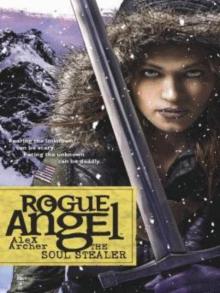 The Soul Stealer
The Soul Stealer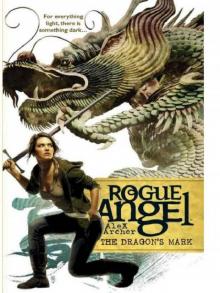 The Dragon’s Mark
The Dragon’s Mark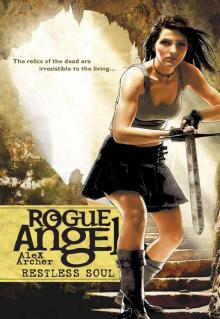 Restless Soul
Restless Soul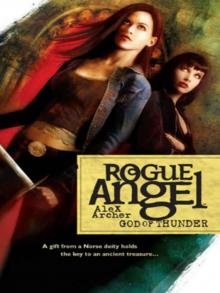 Rogue Angel: God Of Thunder
Rogue Angel: God Of Thunder Rogue Angel 49: The Devil's Chord
Rogue Angel 49: The Devil's Chord Death Mask
Death Mask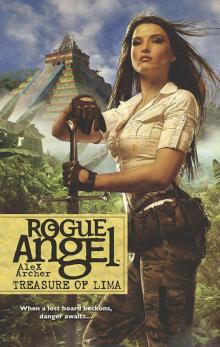 Rogue Angel 46: Treasure of Lima
Rogue Angel 46: Treasure of Lima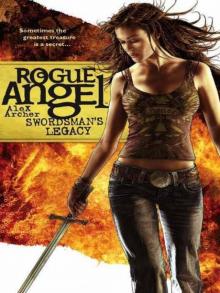 Swordsman's Legacy
Swordsman's Legacy The Oracle's Message
The Oracle's Message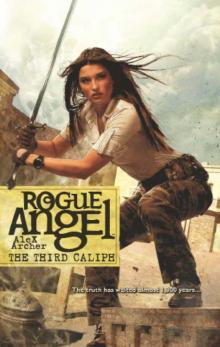 The Third Caliph
The Third Caliph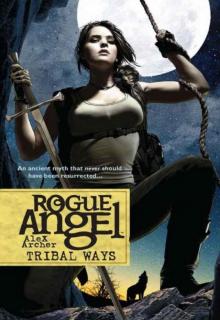 Tribal Ways
Tribal Ways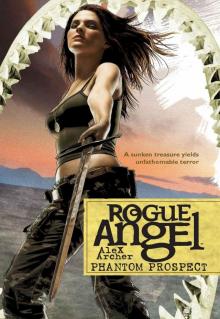 Phantom Prospect
Phantom Prospect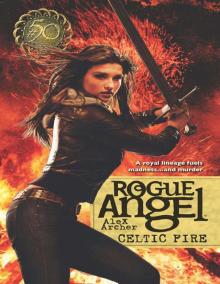 Rogue Angel 50: Celtic Fire
Rogue Angel 50: Celtic Fire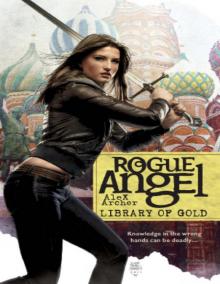 Library of Gold
Library of Gold Rogue Angel 53: Bathed in Blood
Rogue Angel 53: Bathed in Blood Sacred Ground
Sacred Ground The Devil's Chord
The Devil's Chord Serpent's Kiss
Serpent's Kiss The Vanishing Tribe
The Vanishing Tribe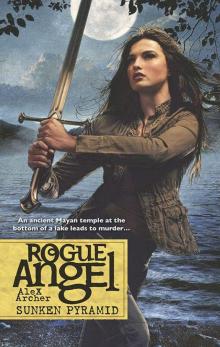 Sunken Pyramid
Sunken Pyramid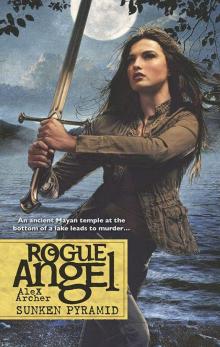 Sunken Pyramid (Rogue Angel)
Sunken Pyramid (Rogue Angel)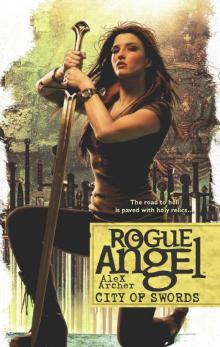 City of Swords
City of Swords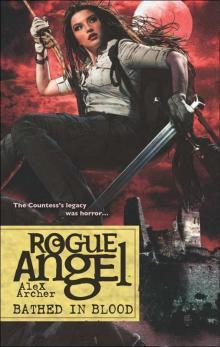 Bathed in Blood
Bathed in Blood The Lost Scrolls
The Lost Scrolls The Babel Codex
The Babel Codex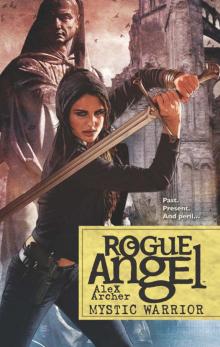 Mystic Warrior
Mystic Warrior Eternal Journey
Eternal Journey Beneath Still Waters
Beneath Still Waters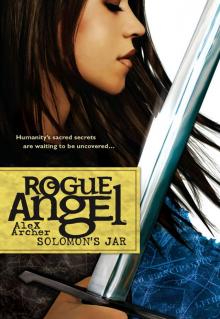 Solomon's Jar
Solomon's Jar Beneath Still Waters (Rogue Angel Book 55)
Beneath Still Waters (Rogue Angel Book 55) Cradle of Solitude
Cradle of Solitude Secret of the Slaves
Secret of the Slaves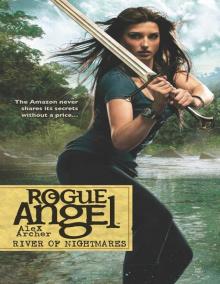 River of Nightmares
River of Nightmares Polar Quest
Polar Quest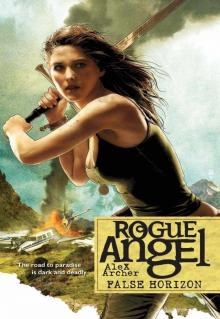 False Horizon
False Horizon